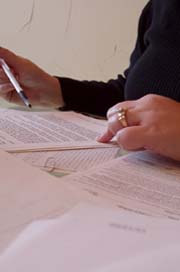The purpose of a CV is not, in fact, to get you a job; it is simply a vehicle to get you through to the interview stage. The interview is where you can let your personality and enthusiasm for the position shine through, and have time to expand on points you make in your CV. So obviously don’t be tempted to put absolutely everything on your CV, or even more importantly be “imaginative with the truth” as you will be instantly found out once the interviewer starts asking you for more details.
Your CV is an advert for yourself. As such, it must be a well presented, visually striking document. You are trying to attract the attention of the person sifting through hundreds of similar applications and sell yourself for the job.
Put yourself in the shoes of the person reading the CV. What sort of information will they be looking for, what is likely to be most relevant for the position? You must then tailor-make your CV for that job. Rearrange the information you have so the most relevant material is first, and highlight some of your achievements more than others. You should never just print off 100 copies of a generic CV and send it to all the companies you can think of. Target each CV to the position and company you are interested in. This may take you a long while, but don’t worry – it’s time very well spent. It will vastly improve your chances of being called for interview and hopefully accepted on to your choice job.
General points
 Don’t bother writing ‘Curriculum Vitae’ in big bold letters across the top. It’s painfully obvious what the document is; use the space to make your name stand out instead. You should provide a variety of contact details (eg. landline and mobile phone numbers, postal address, email), and they should be easy to find on the page, preferably right at the top below your name.
Don’t bother writing ‘Curriculum Vitae’ in big bold letters across the top. It’s painfully obvious what the document is; use the space to make your name stand out instead. You should provide a variety of contact details (eg. landline and mobile phone numbers, postal address, email), and they should be easy to find on the page, preferably right at the top below your name.
Keep it concise and to-the-point. In general your CV should not be longer than two pages, although some positions, like a technical PhD position, may request extra details on your experience or publications.
First impressions are just as important for a CV as for an interview. Use an uncluttered and clean-looking, clear structure. Bullet points are your friend; long, heavy paragraphs of solid text are your enemy – they look intimidating on the page and an employer might just not bother reading it.
Your employment or academic history should begin with the most recent and work backwards. Don’t list every single GCSE grade if you’re short of space. List how many As, Bs or Cs you got, and state specifically for the more important ones like English, Maths and Science.
Emphasise your skills and experience. Focus on the last few years and your greatest accomplishments – ignore the minor roles which are already implied by the bigger things you’ve done. And don’t just list things, state your role, the action you took, what results you achieved and what experience you gained. Never assume that the employer will know what was involved, or what skills you needed. Don’t simply state you were the accountant for a University club: describe how you gained experience in handling budgets, balancing costs and income. If you do make a claim about a skill though, always provide evidence for it.
Leave out less relevant information,and certainly don’t linger on any negative points. If you changed courses at University simply state the fact. Don’t waste space trying to justify anything, it might begin to look like you have something to hide. If the interviewers are interested, they will ask you for more detail.
Always be absolutely honest. Don’t even think about putting down “fluent in French” because you have an A at GCSE. Companies have been known to switch to the language half-way through the interview and expect you to cope.
If you do put in a section on your interests and hobbies, don’t just list reading, socialising and cinema. Everybody likes these things. Think of activities that make you stand out as an interesting personality, and explain if you have developed any skills from them. Rock climbing, for instance, may teach you attention to detail or to meticulously follow safety procedures.
Always take a copy of your CV into the interview with you so that you can refer to it if necessary and make sure you read through it before you go in so that it’s fresh in your mind.
Content
- Personal details
- Skills & career summary
- Key achievements
- Qualifications
- Career history
Depending on what kind of position you are applying for, the different sections will become more or less important. For example, your work experience and skills will be more important when applying for an actuarial job, but your academic qualifications will be more prominent on a CV for a postgraduate position.
Style
 Firstly, and most importantly, never create your CV using one of the standard templates available from various websites or software packages. You are looking to stand out from the crowd, and your employer will already have waded through piles of identical CVs designed in this way. Always design you own, making good use of bold type, subheadings, bullet points, and so on, and your CV will stand out.
Firstly, and most importantly, never create your CV using one of the standard templates available from various websites or software packages. You are looking to stand out from the crowd, and your employer will already have waded through piles of identical CVs designed in this way. Always design you own, making good use of bold type, subheadings, bullet points, and so on, and your CV will stand out.
First impressions are just as important for a CV as for an interview. Use a good quality paper and make sure it has been printed cleanly. Don’t try to be too fancy; simple black ink on cream or white paper looks professional and is easy to read. Any covering letter should be printed on identical stationary.
The layout should be well-spaced and uncluttered. Try not to write too many paragraphs of text; bullet-points look better and force you to summarise the key points. Use an easily-read font such as Times or Arial, with a size of 12pt. Bold and italics should be used sparingly to emphasise the main features.
Use margins to give the page an open look, but not too wide so that is appears as if you are trying to use up space.
Always check spelling and grammar. If your CV is poorly written and contains obvious mistakes it will reflect very badly on you. A CV is an advert for you, and you should present the best face you can. Don’t rely on a computer’s spell checker either, as this will not necessarily spot all mistakes. Ask someone that hasn’t read the document before, such as your parents or a friend, to look through it for you. Once you’re too familiar with something, you glance over the text and can miss even quite obvious mistakes.
If you are emailing your CV, be aware that text files can sometimes become reformatted between computers and end up looking nothing like the document you carefully designed. If you can, it might be a good idea to save your CV as an Adobe Acrobat pdf (portable document format) to stop it being reformatted. However, not everybody will necessarily have Adobe Acrobat and so it’s worth checking beforehand to make sure you’re sending it in a readable format.
Covering letter
Unless you are specifically told not to, you should write a covering letter to accompany your CV. This will help to ensure the CV gets to the right person, and will also give you another opportunity to advertise yourself.
Use the covering letter to introduce yourself, say why you are interested in the position, where you heard about it and also say why you feel you are the right person for the job. However, be careful not to simply repeat what it says in the CV. Use the job description as a guide, but don’t address every minor point in turn or the letter will sound very boring.
State when you are free for interview, or would be able to start work were your application successful. If the job is advertised as having a negotiable salary, do not mention this here. This is something you can discuss much later – when they offer you the job.
The covering letter is not an opportunity to go on and on, however. Make sure you cover the important points, and leave it at that. Never make your letter any longer than a single page.
Related Links
Great CVs
Some general advice on writing CVs and covering letters.
TargetJobs UK: CVs and covering letters
Convince engineering recruiters you’re perfect for their graduate job.







